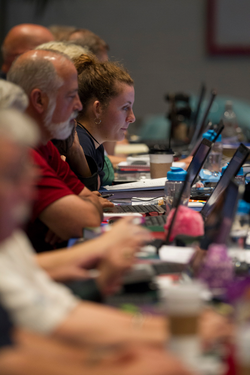After meeting 220 times, the Presbyterian Church (U.S.A.) opened the business of the 221st General Assembly (2014) with a brand new twist designed to help speed up handling of routine items, leaving more time to deal with more controversial issues – and not incidentally hoping to reduce the need for multiple late-night sessions.
The inaugural "Wednesday Consent Agenda" contained 132 items that had received super majorities of 75 percent or more during committee deliberations. Assemblies have always had consent agendas during each committee report, but this pulled all such items into one action.
Under a consent agenda, there is no discussion and the vote must be unanimous; however, items can be removed from the proposed agenda by just one commissioner.
“Adoption of an effective consent agenda permits the Assembly to talk about the issues it needs to talk about, and not get mired in the bushy undergrowth,” said Jim Collie, one of the three trackers of the flow of General Assembly business.
Seventy items that had received a super majority were not included on Wednesday's agenda, including elections, proposed changes to the Constitution or initiatives that committees wished to highlight for the entire body during their report.
Susan Orr, moderator of the Bills and Overtures Committee, pointed out that all commissioners have a right to remove an item from the consent agenda for any reason. “But please be respectful of the limited time and energy the Assembly has in deciding to remove anything from the consent agenda,” she said.
Commissioners, facing a challenging docket of complex issues, took this advice seriously and removed only eight items.
“You may not have to stay up all night,” said Moderator Heath Rada, to the applause of commissioners. “But I won’t speak too soon.”
Speaking for a number of committees, Gene McEvoy, moderator of the General Assembly Procedures Committee, said, “Most of the wonderful business our committee accomplished is in the consent agenda and will not be highlighted in our report presentation. I strongly urge you to take time to read and digest what you have adopted.”
Some of the substantive items passed on the consent agenda include
- a resolution to support hotel and hospitality workers by supporting just wage and work practices in hotel contracts,
- adoption of new standing rules for the General Assembly that begin with values to shape the Assembly as a community of Worship, Work and Witness,
- adoption of the recommendations of a Special Committee to Review the Preparation for Ministry and Standard Ordination process that call upon presbyteries to use the flexibility granted to them to enhance multi-cultural diversity in the preparation process,
- affirmation of occupation-free investment in Palestine,
- establishment of a task force to study how Korean-speaking churches can develop into healthy members of the PC(USA),
- a resolution to work towards food sovereignty for all, and
- a resolution on developing a comprehensive social witness policy on human trafficking as a human rights issue.
Items removed from the consent agenda include whether or not to provide childcare at General Assembly, the status of the Hanmi (Korean) Presbytery and whether to designate executive presbyters as corresponding members.

